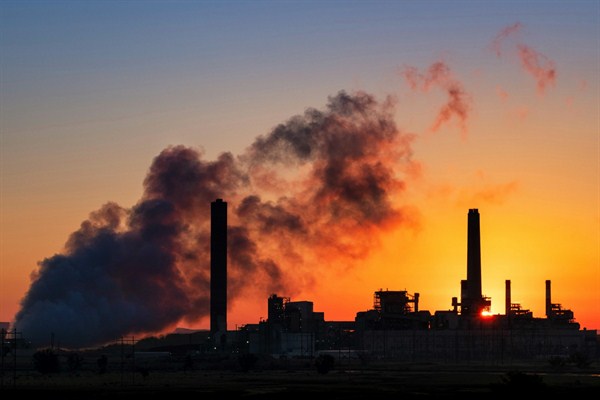The Trump administration on Tuesday unveiled its proposal to relax environmental regulations on coal-burning power plants across the United States. The Environmental Protection Agency’s Affordable Clean Energy rule would roll back the Obama-era Clean Power Plan, which had placed stricter national pollution standards on power plants in an effort to reduce carbon emissions and push American utility companies away from coal and toward natural gas and renewable energy sources, such as wind and solar.
It is the Trump administration’s biggest move yet to boost the American coal industry. But according to the EPA’s own analysis, the new rule could lead to up to 1,400 premature deaths every year by 2030, given the increase in pollutants, compared with the Obama-era rule. The Trump administration has promoted its plan, which would allow states to set their own limits on carbon emissions from coal power plants, as a way to create new jobs, eliminate government regulations and deliver on a longstanding promise of President Donald Trump to “end the war on coal.” Before he became president, Trump often called climate change “a hoax,” including on the campaign trail before the 2016 election.
World Politics Review has covered the international implications of the Trump administration’s energy and environmental policies since the early days of Trump’s presidency, when he immediately announced that the U.S. would withdraw from the landmark Paris agreement on fighting climate change. This collection of five recent WPR articles offers comprehensive analysis and context to better understand this headline news.
Is It Wishful Thinking to Expect the U.S. to Return to the Paris Climate Deal?
Neil Bhatiya | April 27, 2018
In his staunch defense of multilateralism delivered to Congress in April, French President Emmanuel Macron expressed his hope that the U.S. would not in fact leave the Paris agreement. Macron’s appeal to the need for active American leadership on climate policy underscores perhaps the most significant obstacle to an effective global response to the threat of global warming: The U.S. still disdains a role for the federal government in actively regulating decisions made about environmental protection in general and climate change specifically. It is not simply a rhetorical undermining of a role for government; Trump and his closest advisers are trying to make their threats a reality in their policy and fiscal decisions.
Is the G-20 Heading for a Showdown With Trump on Climate Change?
Guy Edwards, Benjamin N. Gedan | May 21, 2018
So far, the G-20 warm-up meetings ahead of the November Leaders’ Summit in Buenos Aires have not rocked the influential forum, whose members represent 85 percent of global economic activity. But there are low expectations for the November summit, which requires consensus among member states to get anything done. One likely victim of American obstructionism under Trump is the global climate change agenda. That is especially unfortunate, given Argentina’s impressive domestic advances on climate policy following Germany’s efforts to prioritize climate change when it held the G-20 presidency last year.
U.S. Clean Energy Cuts Play Right Into China’s Hands
Sagatom Saha | Feb. 23, 2018
There is a future in which wind turbines, twice as tall as the Statue of Liberty, produce electricity across the United States. In this same future, inexpensive solar cells would coat windows, turning office buildings and homes into self-reliant electricity “prosumers.” Best of all, these technologies would be American innovations. The U.S. could breathe a sigh of relief after China briefly became the leading producer of the world’s clean energy technologies. Instead of risking continued Chinese dominance, the U.S. would have chosen to invest in public research and development to will this better future into existence—to design advanced technologies to help allies combat climate change and advance America’s broader diplomatic agenda. The Trump administration’s federal budget proposal would prevent this scenario.
The Future of Climate Diplomacy After Trump’s Exit From the Paris Agreement
Neil Bhatiya | June 2, 2017
Despite the new agenda in Washington, the international community, including countries the U.S. considers traditional allies and close friends, has given every indication of moving full steam ahead on reducing carbon emissions. That underscores one very important fact. Regardless of how the U.S. sets its own energy and environmental policies, it will run into the reality that climate change matters to global diplomacy in a way that it has not previously. Key states in strategic regions like the Asia-Pacific have already seen the destabilizing effects of natural disasters on political stability and economic growth, which are projected to continue well into this century. It is thus no surprise that many Asian states also understand the extent to which climate change is a threat to their national security, and so will remain committed to diplomatic efforts to strengthen the Paris agreement, rather than follow the U.S. out of it.
What Would a China-Led Global Climate Policy Look Like?
Theresa Lou, Sagatom Saha | April 14, 2017
The immediate effects of U.S. retrenchment in the fight against climate change are worrying, but the long-term cost of abdicating climate leadership will be far more consequential. American negotiators were essential to building international consensus around the Paris accord. By walking back U.S. climate commitments, Trump offers Chinese President Xi Jinping the opportunity to pick up the baton. Although Beijing had previously resisted international efforts to establish binding carbon emission limits, it recently made significant efforts to limit its emissions and is now urging the U.S. to uphold its climate commitments—instead of the other way around. The fact that China, the world’s largest emitter, is willing to pick up the mantle of climate change leadership seems like good news for the planet. But it is too soon to breathe easy.
The contents of this report, and of all In Context reports, can be viewed by both subscribers and non-subscribers. But only subscribers can access the full articles when they click through on the headlines above.
[marketing]boilerplate[/marketing]

